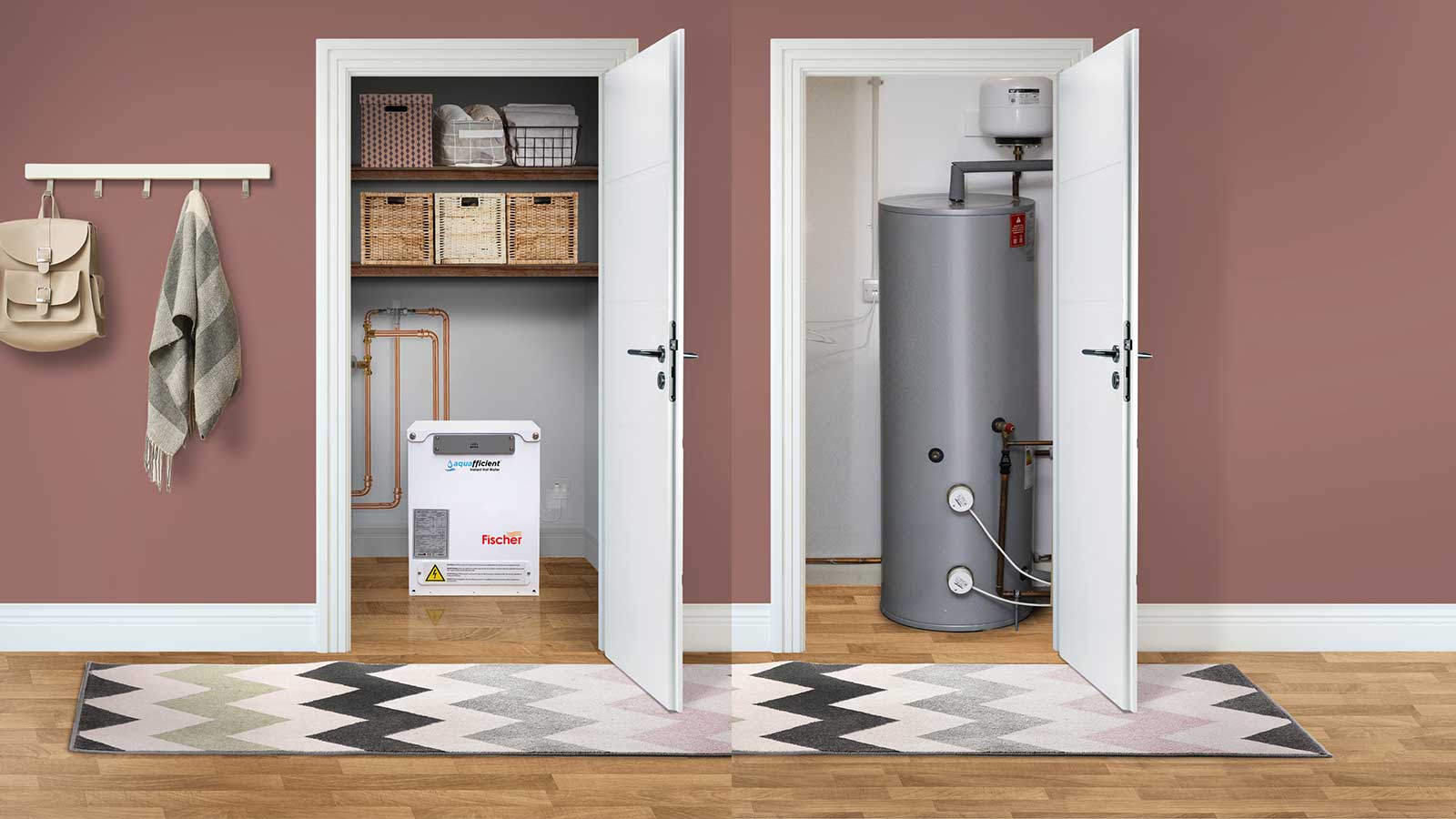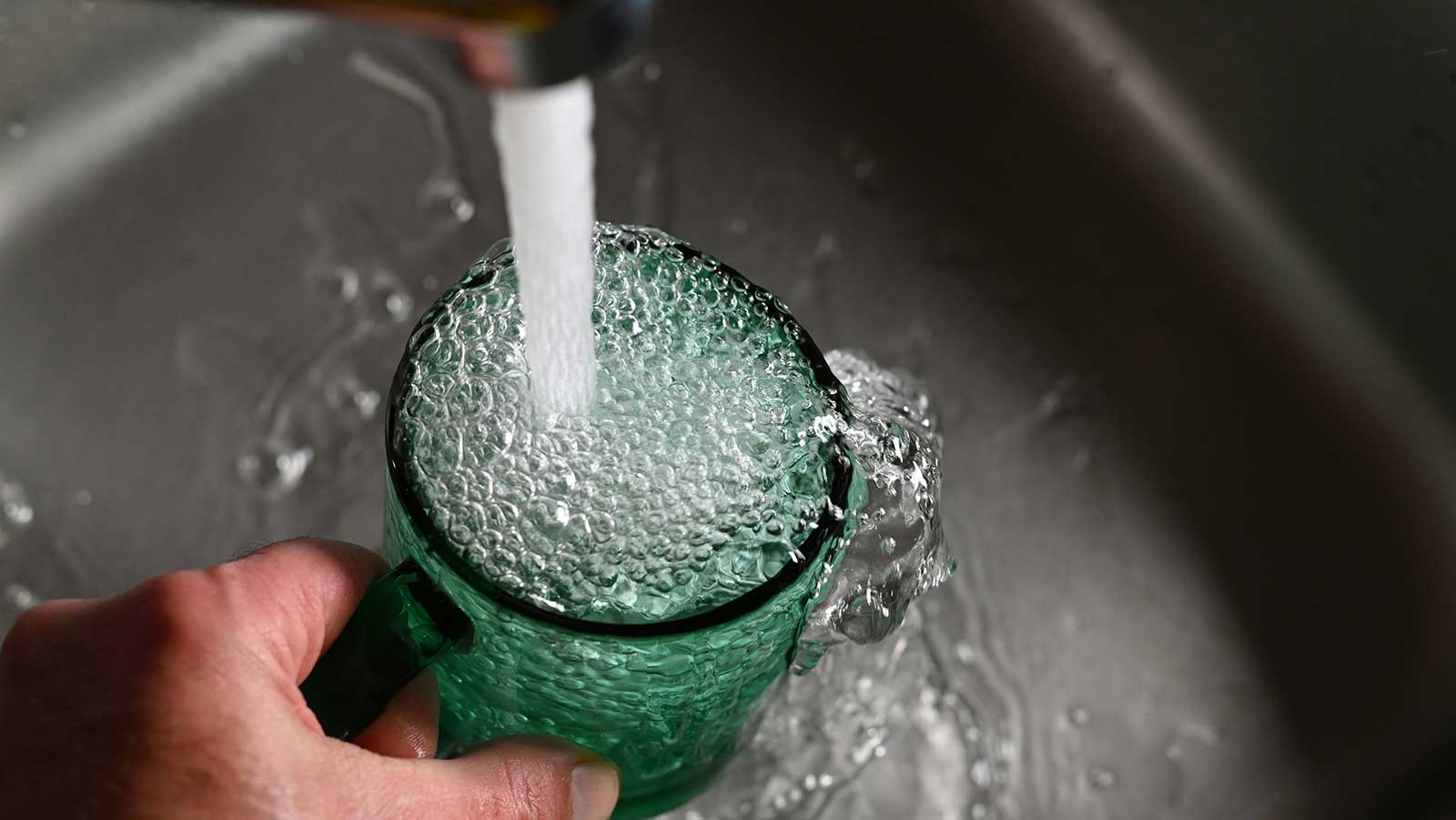Whatever time of the year, there’s nothing worse than having an issue with your hot water supply. Hot water is a household necessity, but if you’re noticing problems with your current water heating system, it may be time to rethink your current setup.
If you’re not sure what type of water system to go for, we’re here to help uncover the differences between a tankless vs a traditional tank water heater including the pros and cons of both systems for your home.
What’s a tankless water heater?
Tankless water heaters provide your home with hot water without the need of a storage tank. They work by heating water exactly when you need it, providing an endless supply of H₂O around the clock. It’s exactly why they’re also known as on-demand water heaters.
A modern tankless electric water heating system like Fischer Future Heat’s Aquafficient uses a single heating element to provide hot water while it’s running through. Hot water is created by storing heat in a unique phase change material, known as a heat battery.
Once the battery has been fully charged, it will pass the heat energy stored inside to the cold water coming into the unit. Heat is only transferred when the need for hot water is triggered by the household, like running the hot tap. As a result it means your home has a 24/7 hot water supply. You can shower and go about your day rest assured there’s a constant supply, since the battery automatically recharges itself once it runs out.
What’s a tank water heater (hot water cylinder)?
Tank water heaters, also known as hot water cylinders, are large traditional household appliances which store warm water in an insulated tank (the name says it all!) once it’s been heated. Therefore, pre-heated hot water is stored, providing a large volume of water readily available for your household use as and when it’s needed – as long as the water heating has been ‘switched on’ to heat it in advance.
Hot water tanks are typically fitted within an airing cupboard, wrapped in an insulated jacket to improve heat retention throughout the winter. Traditional water heaters have been the standard in UK homes for decades.
Pros and cons of a tankless water heater vs a regular, traditional tank water heater
With the Government’s net zero targets encouraging households to make energy efficient changes to their home, many are considering updating their current heating systems to reduce their carbon footprint.
If you’re not sure which water heating system is best for you, we’ve weighed up the pros and cons of tankless vs tank water heaters to help you understand the differences.
Is a tankless water heater better than a regular one?
In most cases, yes. Tankless water heaters provide endless hot water, are more energy efficient, and last much longer than traditional systems. While the upfront cost can be higher, the long-term savings and reliability make them a better choice for many households.
The benefits of a tankless water heater
- Endless hot water: a tankless water heater means your household will have hot water on demand, meaning no more running out of warm water during showers or if multiple home appliances are in use
- Improve energy efficiency: going tankless means you’re creating a more energy-efficient electric home while having a consistent hot water supply, saving you energy costs long-term
- Long-life span: with a life span of approximately 40,000 heating cycles, tankless water heaters have an equivalent 50 years of usage
- Fischer Future Heat’s Aquafficient can store four times more heat than a domestic water cylinder (water tank) and provides up to 280 litres of hot water, depending on the size of the unit installed
- No more need for a bulky storage tank: Tankless hot water heaters like Aquafficient are on average, half the height of an average water cylinder (traditional water heater), saving you space with a more compact design. They can be wall-mounted, creating space above the system in your airing cupboard or utility room
While tankless systems can be more costly upfront, you will save more long-term by reducing energy waste since the design heats water only when you need it.
The benefits of a tank water heater
- Simpler installation: since they’re a more traditional system, tank water heaters require fewer connections meaning they can be installed quickly
- Common option with large homes: like tankless systems, hot water cylinders too can store a large volume of water, making them idyllic for large, busy households in need of warm water at peak periods of the day
However, there are some disadvantages to traditional water heaters:
- Less energy efficient: traditional water heaters continuously work to maintain the water’s temperature, even if your household is not using it, causing standby heat loss and increased energy bills
- Limited hot water supply: once you’ve used all the tank’s hot water, you’ll have to wait for the system to heat up and refill again, which can cause a gap in your hot water supply – making busy mornings less efficient
- They take up more space: while older homes are built with airing cupboards, a traditional cylinder system takes up more room, limiting storage options
- Runs for a shorter lifespan: traditional systems last on average between 8 to 12 years vs 50 years of use compared to electric water heaters
Save long-term with a tankless water heater
For many modern homeowners, with the initial cost of a tankless system vs installing a long-term energy-efficient alternative, the drawbacks of a traditional water heater make a strong case for making the switch.
With UK energy prices set to rise again this autumn by 2%, now could be the perfect time to update your water heating system. Join our customers who have benefited from switching to the Aquafficient hot water system.
- The Rise in UK Gas Prices (Again!) and What It Means for Homes - February 23, 2026
- Should you leave the heating on while you’re away for Christmas? - December 19, 2025
- Hosting Christmas: How to Heat a Busy Home Efficiently - December 15, 2025

